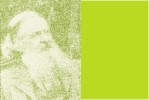Maria
Augusta Nogueira Machado Dib
jmdib@uol.com.br
PUC - SP - Brazil
JENSENS'S, FREUD'S, AND PEIRCE'S GRADIVA
ABSTRACT
Intended as an advance to this author's Communication of the previous year
- Considerations on Pierce and Freud, two authentic representatives of "Geist
der Zeit", which was conceived in the second half of the 19th century,
the time they were born - this Communication presents an analogy between
Charles Sanders Peirce's scientific investigation methodology and Sigmund
Freud's psychoanalytic investigation methodology.
This analogy is focused on a character from a literary work analyzed by
Freud - Gradiva - whose name itself justifies both methodologies' becoming
closer, advancing step by step.
Within a more subjective, free perspective, literary author Wilhelm Jensen
gives free rein to fantasy, creating a narrative - Gradiva: a Pompeiian
Fantasy - where imagination and reality meet.
Physician, scientist and author Freud, within a more objective perspective,
analyzes Jensen's work to identify central points of the psychoanalytic
theory he had recently formulated, and which revealed the functioning of
the psychic apparatus and the human mental life expressed in every day life,
dreams and mental disturbances.
Peirce, within a perspective that joins the freedom of creative subjectiveness
and the acuity of scientific objectiveness, the philosopher, scientist and
author reveals the semiosis of cosmological mental life by formulating the
categories: firstness, secondness and thirdness, and his investigation theory
or the scientific method theory.
If, as Mason (1962:499) did, "we may say that Science is a human activity
developing a growing set (from History's point of view) of techniques, empirical
knowledge and theories that are interrelated and refer to the natural Universe",
and as Sarton stated, "Science is the only human activity that is truly
cumulative and progressive", what can we say of the Peircean and Freudian
Sciences, which are historically so close, as to their investigation methodology?
"During the modern period of History, Science and experimental research,
jointly with the qualitative inductive and quantitative deductive methods
debated in the first decades of the 17th century, progressively found their
application, … and Science took an increasingly important place in
all systems of thinking, whether it was liked or disliked."
Based on the idea that "The scientific method is essentially a way
of discovering new phenomena and formulating new theories, in such a manner
that Sciences constitute continuously expanding knowledge systems"
, what can we say of Freud's and Peirce's Gradiva for the current days?
KEYWORDS: Science, Investigation Theory - Scientific Method, Psychoanalytic Investigation Method.
Center
for Pragmatism Studies
Philosophy Graduate Program
Departament of Philosophy
Pontifical Catholic University of São Paulo - Brazil


